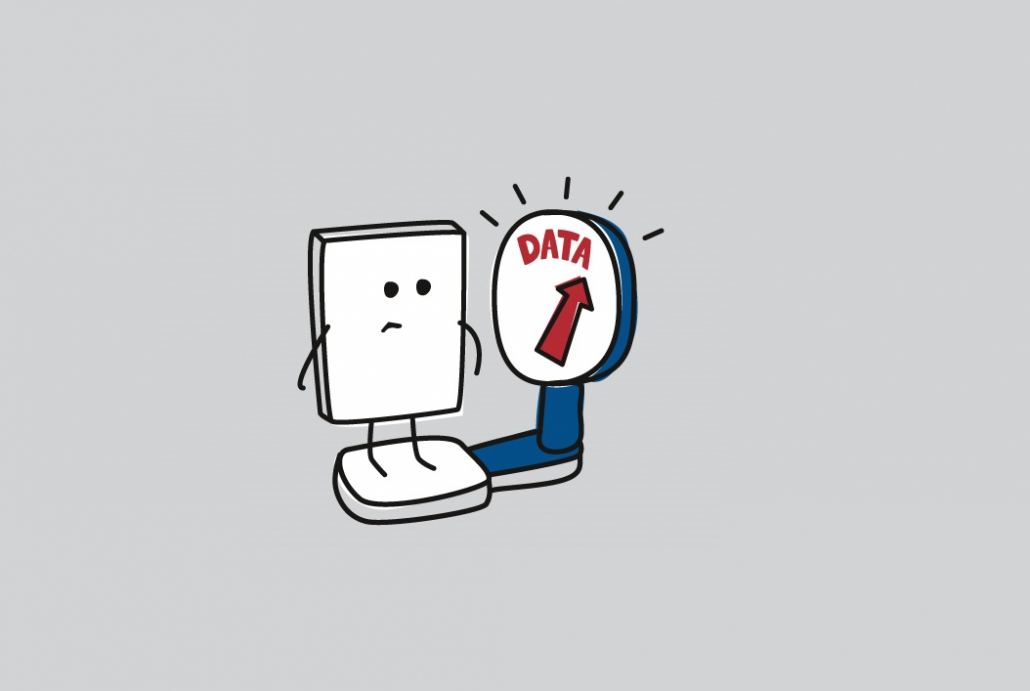A hundred years ago the average person might process the same amount of information in their lifetime that our brains currently receive in a week. I came upon this fact recently – somewhere – but I couldn’t tell you where. I started to look for the source, but searching my overstuffed digital folder “Interesting Things to Blog About” proved fruitless. It’s been lost somewhere in the sheer volume of information in my digital life. Maybe it’s time for a data diet?
Take a moment to think about this ever-increasing flow of information: our phones and laptops constantly demand our attention. We get alerts about the news, about messages from friends or family, about emails from colleagues (to say nothing of the emails from the mailing lists we signed up to in the hope of a quick discount); we are alerted when a new episode of our favorite podcast is available, or when a new television series is released (“popular with other viewers who also watched…”).
Alongside the signals we receive there is also the information we are broadcasting to the world; information we throw out unthinkingly and unceasingly.
Every day, without noticing, we scatter our personal data about on public transport, at the grocery store, or in online reviews. Cookies in our browsers follow us everywhere, our browsing histories tell stories about who we are that we might not even know ourselves. We drop these morsels of information wherever we go, physically and digitally and think nothing of it. Of no obvious value to us, these nuggets of information are increasingly valuable to businesses and governments; vast aggregations of data points form the basis of an entirely new economy.
Our digital world is generating an inexhaustible, exhausting, abundance of data.
In the ten years since Jack and I founded Get the Data it has become increasingly difficult to sort the wheat from chaff. Distinguishing the nourishing data that sustain an organization from the nutrition-free – the empty calories that simply fill a void but leave an organization feeling bloated and lethargic – is important for any organization that values efficiency.
This is particularly true when reviewing the key performance indicators (KPIs) used by organizations and sectors to track the progress they are making towards their goals.
Several years ago, Jack led a review of performance indicators collected by Local Criminal Justice Boards in England and Wales. He found that there were over 1,000 indicators for the operation of the criminal justice system. Indicators were reported by the police, the Crown Prosecution Service, the courts, the probation service, and prisons. This glut of data was making it increasingly difficult to discern just how well the criminal justice system was doing at detecting crime, bringing offenders to justice, helping victims, and keeping communities safe.
In the years since that review Get the Data has been invited to develop, review, and rationalize performance indicators for a variety of organizations, to give them a clearer account of their performance. Much of the guidance on creating and using KPIs comes from the banking, hospitality, manufacturing, and retail sectors; industries that are focused on sales, turnover, the efficiency of processes or the client experience.
In contrast to these commercial organizations, many of our clients work with complex, often seemingly intractable, social problems. The work of these organizations may be more process orientated and focused on goals which may not have easily defined endpoints, addressing social issues such as reducing reoffending, preventing homelessness, improving mental health, and widening access to drug and alcohol services.
Understanding this context is a prerequisite to our work in this sector, where our clients “theories of change” will demand more detailed measurement than the sales targets or conversion rates used by commercial organizations.
Our experience has shown that it is important that the merits of performance indicators should be judged on the following criteria:
- Relevance: do your organization’s performance indicators relate to its strategies and objectives? If not, then consideration should be given to why they are being collected.
- Specific: are your performance indicators unambiguous, clear, and focused on what needs to be measured? If not, then what should be measured?
- Reliable: is their measurement based on sound quantifiable data? The data should be sound, but if it isn’t then it’s time to consider the worth of the indicator.
- Realistic: related to the “Reliability” criterion, does the time and cost to measure the indicator outweigh its value?
With all of this in mind it might be worth asking what data your organization is collecting, and whether your performance indicators are doing the best that they can. Is it time for your organization to go on a data diet?
Get the Data’s systematic approach helps our clients to understand the value of their performance indicators and to determine whether they are truly key performance indicators, those that are integral to monitoring an organization’s performance.
Please contact either Jack or me if your organization is currently in its planning cycle and needs assistance with developing or reviewing its performance indicators. Our experience and expertise will help you to manage the data glut, providing you with a suite of indicators that will improve how you manage your organization’s performance.
